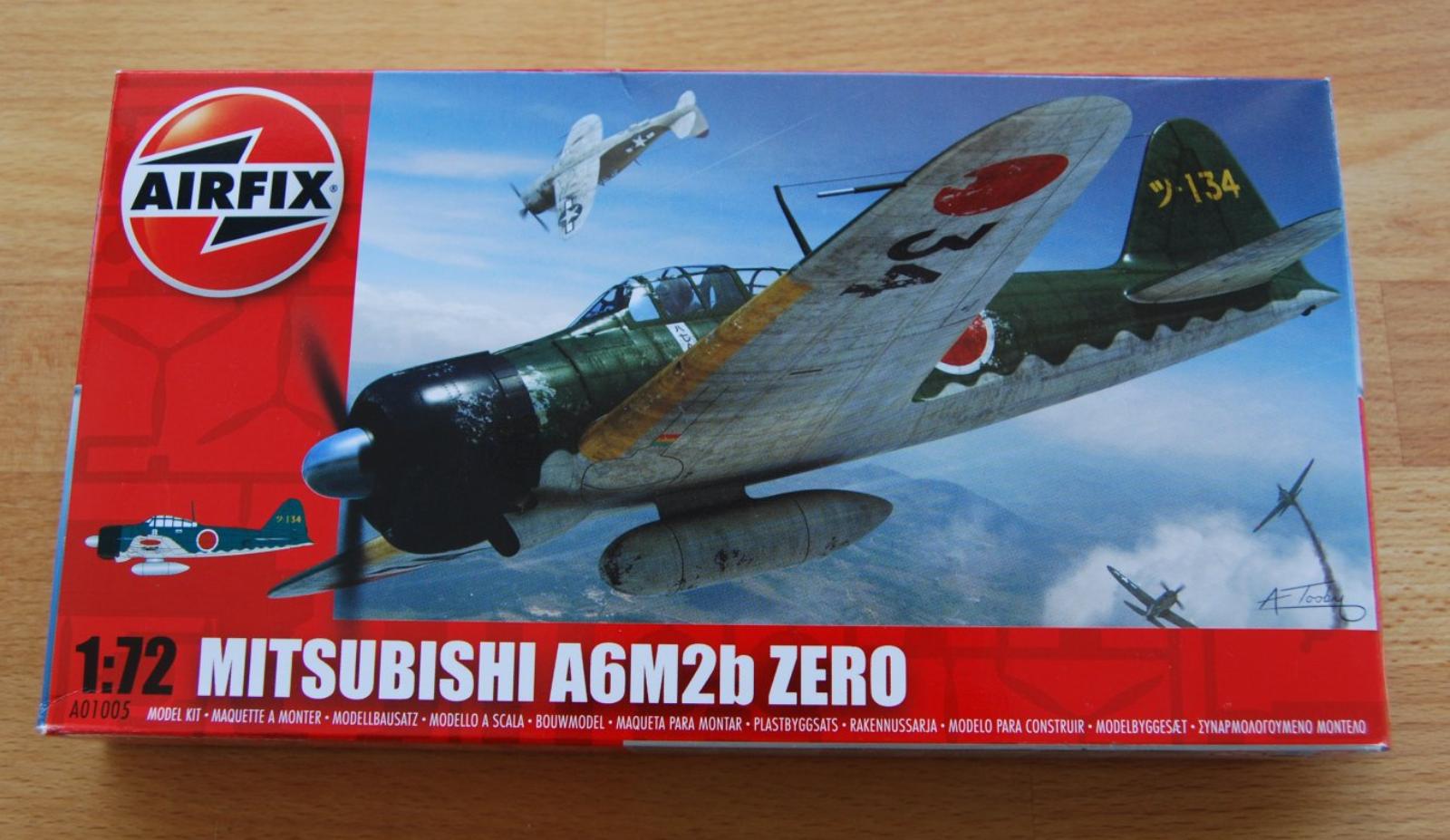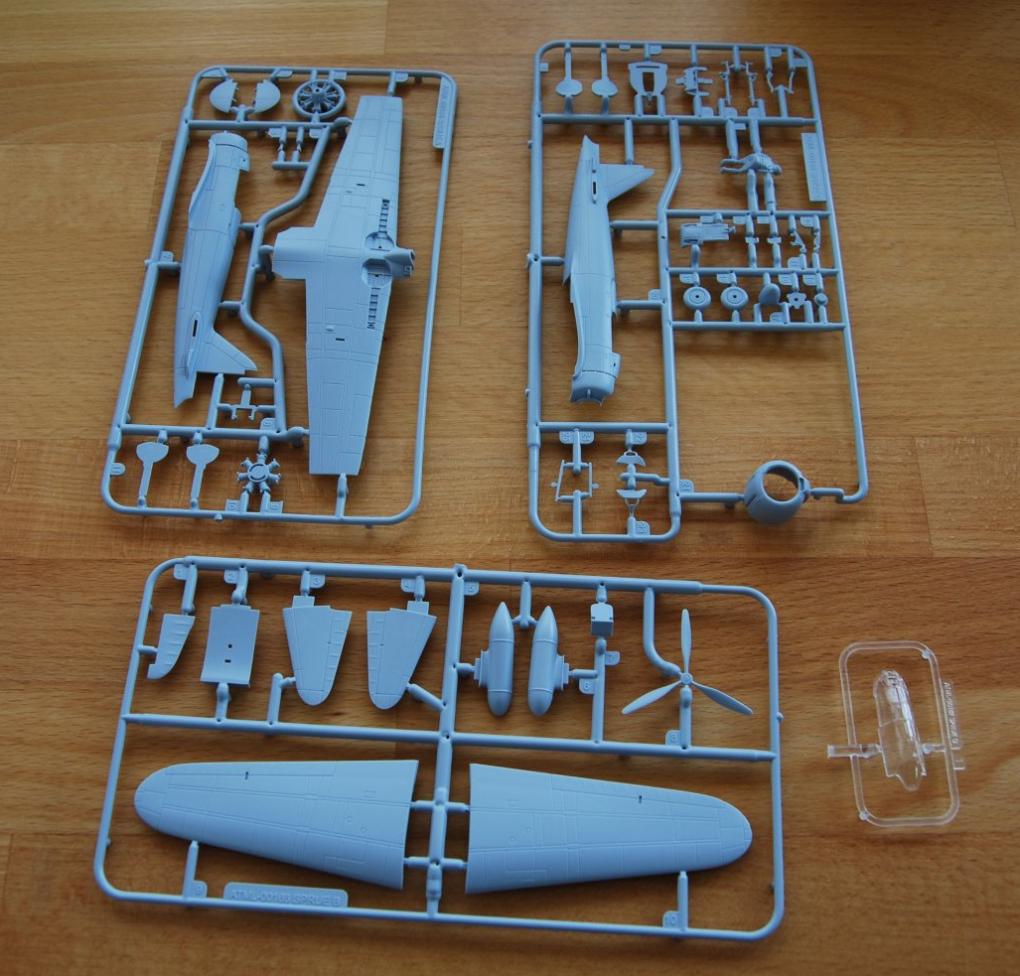Manufacturer: Airfix
Scale: 1/72
Additional parts: none
Model build: Jun 2014

Manufacturer: Airfix
Scale: 1/72
Additional parts: none
Model build: Jun 2014
Leutnant Franz Hartmann gripped the control stick, his knuckles white. Below him, the English Channel churned a steely gray, a stark contrast to the nervous sweat prickling his skin. This wasn't his Messerschmitt Bf 109, the familiar hum of its engine replaced by the snarling growl of the Mitsubishi A6M Zero. It was a beautiful machine, sleek and deadly, but also alien.
He glanced to his wingman Matsuo, the Japanese pilot who had ferried the plane across the USSR. Matsuo offered a curt nod, his dark eyes glinting with a mix of anticipation and concern. They were part of Jagdgeschwader 27, a unique unit flying these loaned Japanese fighters in the upcoming offensive against England - Adlertag.
Franz had been skeptical at first. The Zero's maneuverability was undeniable, a dancer compared to the blunt force of the Bf 109. But its vulnerability worried him. Exposed fuel tanks and lightweight construction made it fragile prey.
The briefing echoed in his head. Surprise was their only advantage. The RAF wouldn't be expecting Zeros over the English coast.
A crackle on the radio jolted him back to the present. Matsuo barked out a warning in Japanese, then switched to German. "Enemy fighters, ten o'clock high!"
Franz craned his neck. There they were, Spitfires, silver gleams against the blue. Adrenaline surged. He threw the Zero into a tight turn, the unfamiliar controls responding with surprising agility. The tracers from the Spitfires whipped past, stitching the air around him.
The ensuing fight was a blur of speed and violence. The Zero weaved through the dogfight, Matsuo's expert maneuvering giving them the upper hand. Franz got a bead on a Spitfire, unleashing a burst from his cannons. The enemy aircraft shuddered and trailed smoke, spiraling down towards the Channel.
But the vulnerability of the Zero became horribly apparent. One of their squadron mates, a German pilot less familiar with the aircraft, took a glancing blow. Flames erupted from his engine as he plummeted towards the sea, a silent scream echoing in Franz's ears.
The Bf 109s, hampered by their shorter range, were already peeling off, heading back to France. The Zeros, however, pressed on. They were the only ones who could stay and protect the lumbering bombers.
As the sun dipped towards the horizon, casting long shadows across the sea, they finally disengaged. Franz landed his Zero, his body shaking with the aftereffects of the battle. They had inflicted heavy losses, but at a cost.
Matsuo clapped him on the shoulder, a ghost of a smile on his lips. "Good work, Franz. We showed them what the Zero can do."
Franz nodded, the exhilaration of victory tinged with the ever-present shadow of danger. The Zero was a magnificent machine, but this baptism by fire had shown him its limitations. The Battle of Britain had just begun, and Franz knew the skies over England would be a crucible, testing not just the mettle of men and machines, but the fate of nations.
Squadron Leader Douglas Pierce gripped the control stick of his Spitfire, his gaze scanning the endless blue canvas above the English Channel. Sweat beaded on his forehead, a mixture of anticipation and the ever-present wartime tension. Today was the 13th of August, 1940 - Adlertag, as the Germans were calling it. The day they launched their full-scale assault on Britain.
The intel crackled through his headset, a mix of static and urgency. "Multiple bogies inbound, heading north from Calais. Unidentified type."
Douglas' heart hammered against his ribs. Unidentified? This was new. The usual Messerschmitts, he could handle those in his sleep. But something new? A shiver ran down his spine.
Then, there they were. Sleek, stubby shapes against the horizon, sunlight glinting off unfamiliar wings. Zeros. Japanese Zeros, the whispers turned to horrifying reality. The Luftwaffe had pulled a fast one.
The radio erupted in a cacophony of shouts and warnings. The initial surprise gave the Zeros the upper hand. They danced through the sky, their maneuverability a revelation. Douglas gritted his teeth. This wasn't a time for awe. This was a fight for survival.
He dove in, his Spitfire a blur of silver against the blue. The Zero pilot mirrored his move, their dance turning deadly. Tracers lanced past Douglas' cockpit, a chilling reminder of the fragility of his machine. He squeezed off a burst, the cannons barking, but the Zero seemed untouched.
The fight raged. Spitfires swarmed the Zeros, a whirlwind of steel against the backdrop of rolling white cliffs. The sky became a tapestry of smoke trails and fiery explosions. Douglas saw a Zero erupt in flames, the pilot ejecting into the unforgiving sea below. A pang of grim satisfaction mixed with the ever-present fear.
But the Zeros took their toll. Their agility made them difficult targets, and their longer range meant they could stay on the offensive while the Spitfires were forced to consider their fuel reserves. Slowly, the tide began to turn.
Just as despair threatened to engulf Douglas, a new sound filled the air - the unmistakable roar of Merlin engines. Reinforcements. Relief washed over him as fresh Spitfires joined the fray, tipping the balance back in their favor.
The battle continued until the skies bled into twilight. Exhausted and bloodied, the remaining Luftwaffe aircraft, both Zeros and Messerschmitts, limped back across the Channel. The British had won the day, but at a heavy cost.
Landing on a smoke-choked runway, Douglas climbed out of his Spitfire, his body a symphony of aches. He surveyed the scene - wrecked planes, weary faces, and a sense of grim determination. This was just the beginning. The skies over Britain would continue to be a battleground, and the Zeros added a new, deadly element to the fight.
But as he looked out at the channel, the last rays of the setting sun painting the sky in hues of orange and red, a fierce pride filled him. They had faced the unknown, and they had prevailed. The Battle of Britain was far from over, but one thing was certain - the skies wouldn't belong to the Germans alone anymore.

In the spring of 1939, Germany and Japan signed a bilateral agreement aimed at closer cooperation in military aviation development. The accord allowed Luftwaffe test pilots access to new Japanese Army and Navy aircraft, while Japanese pilots were permitted to fly and evaluate Luftwaffe designs at the Rechlin test center.
One of the most notable outcomes of this cooperation came with the introduction of the Mitsubishi A6M Zero. Following the aircraft’s maiden flight in April 1939, it was evaluated at Rechlin by Luftwaffe Leutnant Schneider in August of that year. His official report to Berlin praised the new fighter’s maneuverability and endurance, noting that “the plane has good maneuverability and a range more than twice that of the Me 109.”
After the fall of France in June 1940, Luftwaffe planners turned their attention to operations against Britain. The limited range of the Messerschmitt Bf 109 quickly became a point of criticism among Luftwaffe officers, as the aircraft could provide only 20 minutes of effective combat time over southern England. Seeking alternatives, the Oberkommando der Luftwaffe requested the transfer of A6M fighters from Japan to supplement German fighter units.
Japan, still ramping up production of the Zero, agreed to a limited exchange. In late July 1940, a detachment of 36 A6M fighters was ferried to Germany via the Soviet Union. Two aircraft were lost to accidents during the transfer flight, leaving 34 serviceable machines to be incorporated into Jagdgeschwader 27 along the French coast.
The Zeros saw their first operational use on Adlertag (Eagle Day), 13 August 1940, flying alongside Bf 109s during attacks on southern England. Their presence initially surprised the Royal Air Force, as the type was entirely unknown in European airspace. Several of the A6M were flown by Japanese pilots who had accompanied the transfer and stayed to assist in operational familiarization.
The aircraft demonstrated clear advantages over the Bf 109 in range and agility. Whereas the Messerschmitts were forced to disengage after limited time over target, the A6Ms remained to provide continued cover for German bomber formations. In several early engagements, Jagdgeschwader 27’s Zeros scored notable victories, downing Hurricanes and Spitfires while sustaining relatively light losses.
However, their vulnerabilities soon became apparent. The A6M lacked adequate armor protection for pilot and fuel tanks, making it highly susceptible to fire when struck by RAF .303 or 20 mm rounds. Even minor damage often proved fatal, in stark contrast to the more rugged German designs.
Despite their limitations, the use of the Mitsubishi A6M during the Battle of Britain was judged a partial success. Luftwaffe commanders acknowledged the operational flexibility the aircraft provided, particularly its ability to remain on station above Britain longer than the Bf 109. However, Japan’s own urgent need for the Zero prevented the Luftwaffe from receiving additional deliveries.
By late autumn 1940, attrition had reduced the detachment to fewer than 20 operational aircraft. With no replacements forthcoming, the surviving Zeros were gradually withdrawn from front-line duties and reassigned to evaluation and training.
Although their combat role was brief, the episode marked one of the few occasions in which Axis powers directly shared frontline aircraft during the war.

The Mitsubishi A6M is made from the current Airfix kit which is quite good to build. Really a big difference to the old Airfix kits I build so far. Made OOB, only the colors and decals are different to the original. Decals were taken form a HobbyBoss Me 109 (got a pile of those kits fro 3€ each, cheaper than getting some extra decals).
The model is airbrushed with Revell AquaColor.